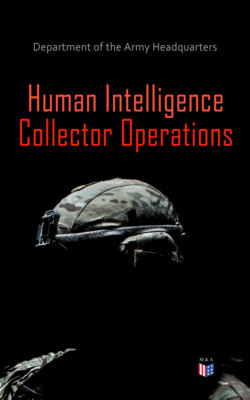Читать книгу Human Intelligence Collector Operations - Department of the Army Headquarters - Страница 28
На сайте Литреса книга снята с продажи.
LIMITATIONS
Оглавление1-32. HUMINT collection limitations include—
Interpersonal abilities. HUMINT is dependent on the subjective interpersonal capabilities of the individual rather than on the abilities to operate collection equipment. HUMINT collection capability is based on experience within a specific AO that can only be developed over time.
Identification of knowledgeable sources. There is often a multitude of potential HUMINT sources. Information in response to specific requirements can only be collected if sources are available and identified that have that information.
Limited numbers. There are never enough HUMINT collectors to meet all requirements. Limited assets must be prioritized in support of units and operations based on their criticality.
Time limitations. HUMINT collection, particularly source operations, takes time to develop. Collection requirements must be developed with sufficient lead-time for collection.
Language limitations. Although HUMINT collectors can normally use an interpreter, a lack of language proficiency by the collector can significantly slow collection efforts. Such language proficiency takes time to develop.
Misunderstanding of the HUMINT mission. HUMINT collectors are frequently used incorrectly and assigned missions that belong to CA, MP, interpreter or translators, CI, or other operational specialties.
Commanders’ risk management. Maneuver commanders, in weighing the risks associated with employing HUMINT collection teams (HCTs), should seriously consider the potential loss of a wealth of information such as enemy activities, locations of high-value personnel, and threats to the force that they will incur if they restrict HCT collection activities. J/G2Xs, operational management teams (OMTs), and HCT leaders must educate maneuver commanders on the benefits of providing security for HCTs and employing them in accordance with their capabilities.
Legal obligations. Applicable law and policy govern HUMINT collection operations. Applicable law and policy include US law; the law of war; relevant international law; relevant directives including DOD Directive 3115.09, “DOD Intelligence Interrogations, Detainee Debriefings, and Tactical Questioning”; DOD Directive 2310.1E, “The Department of Defense Detainee Program”; DOD instructions; and military execute orders including FRAGOs. HUMINT operations may be further restricted by Status of Forces Agreements (SOFAs) and other agreements, execute orders and ROE, local laws, and an operational umbrella concept. Such documents, however, cannot permit interrogation actions that are illegal under applicable law.
Connectivity and bandwidth requirements. With the exception of the size, activity, location, unit, time, equipment (SALUTE) report, most HUMINT reporting requires considerable bandwidth. Deployed HUMINT teams must be able to travel to, and report from, all areas of the battlefield. Digital communication equipment must be able to provide reliable connectivity with teams’ reporting channels and sufficient bandwidth for transmission of reports, including digital imagery.
Timely reporting and immediate access to sources. Except in tactical situations when HUMINT collectors are in immediate support of maneuver units, HUMINT collection and reporting takes time. In stability and reconstruction operations, sources need to be assessed and developed. Once they are developed, they need to be contacted which often takes time and coordination. In offensive and defensive operations, HUMINT collection at detainee holding areas sometimes may still be timely enough to meet tactical and operational requirements. See paragraphs 3-2 and 3-7 for more information on offensive and defensive operations.
